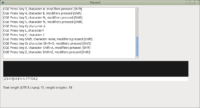 |
 |
- The font rendering behaves better when the text contains a character that we cannot render: it displays a fallback glyph (usually “?”) and makes a warning (using
WritelnWarning, so it goes to log). This allows to easily spot missing characters in the font and makes backspace working sensibly if you input a character which glyph isn’t supported.You can toggle this by setting TTextureFont.FontData.UseFallbackGlyph to
false. -
TCustomizedFont.Load allows to load font texture in a couple of alternative sizes. The resulting font rendering will look better, it will use the best texture, and thus can look crisp regardless of the final size on screen.
It is very easy to use this feature by CastleSettings.xml. Simply define a
default_fontand instead ofsize_at_load="20"use something likesizes_at_load="10 20 30". -
TCastleFloatEdit and TCastleIntegerEdit allow to easily edit a Single / Integer value by an edit box.
-
TCastleScrollViewManual allows to have a scrollbar that controls… well, anything you want (handling OnChange event). This is a more flexible version of TCastleScrollView that scrolls user interface inside.
The new controls and font rendering capabilities can be of course easily tested in CGE editor.
Start the discussion at Castle Game Engine Forum